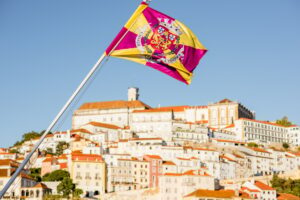Portugal’s Tech Revolution: Beyond Lisbon and Porto
Portugal’s technology ecosystem has undergone a remarkable transformation in 2025, extending far beyond the traditional powerhouses of Lisbon and Porto. The country’s tech sector now encompasses over 34,000 companies generating more than €25 billion in turnover and employing nearly 200,000 skilled professionals. While the capital continues to dominate headlines with events like Web Summit, a new wave of cities is emerging as significant players in Portugal’s innovation ecosystem.
This geographic diversification represents a crucial evolution in Portugal’s tech strategy. Government initiatives, university partnerships, and regional investment programs have created fertile ground for technological innovation across the country. The result is a network of interconnected tech hubs, each with unique strengths and specializations, contributing to Portugal’s position as one of Europe’s most dynamic tech destinations.
Braga: The Northern Innovation Powerhouse
Braga has rapidly transformed from a historic religious center into one of Portugal’s most promising tech cities. Home to over 66 technology companies and supported by the dynamic Startup Braga initiative, the city has become a magnet for entrepreneurs working in biotechnology, nanotechnology, and digital economy sectors.

The city’s tech ecosystem benefits significantly from its strategic location just 30 minutes from an international airport and its proximity to Porto. This accessibility, combined with affordable workspace and living costs, has attracted a growing community of tech professionals and digital nomads. Startup Braga, operating as the innovation hub of InvestBraga, focuses on supporting high-potential projects with global ambitions, particularly in areas like health technologies and sustainability.
Notable companies making waves from Braga include PluggableAI, which secured €1.85 million in funding for its AI-powered fan engagement technology, and Glooma, a med-tech startup developing innovative breast cancer detection devices. The city also hosts established tech firms like Nutrium, a platform supporting nutritionists, and Dotmoovs, an AI-powered sports and fitness app that evaluates user performance through video analysis.
The University of Minho’s presence in Braga provides a steady pipeline of technical talent, particularly in engineering and computer science. This academic foundation, combined with programs like the Startup Braga Acceleration Program, creates an environment where innovation thrives. The program specifically targets entrepreneurs developing solutions in biotechnology, digital economy, nanotechnology, sustainability, and health technologies.
Aveiro: Portugal’s Silicon Valley
Often referred to as the “Portuguese Silicon Valley,” Aveiro has earned this distinction through its exceptional focus on technology and innovation. The city’s transformation into a tech hub is largely driven by the University of Aveiro, which has created strong bridges between research, business, and practical application. This week’s FutureXPO event, attracting over 400 participants including 75 Portuguese and 50 Brazilian startups, showcased Aveiro’s growing international relevance.
The Aveiro Tech City initiative demonstrates the city’s commitment to using technology as a means to improve quality of life. This municipal program has transformed the urban area into a living laboratory where businesses, projects, and services are developed, tested, and implemented. The initiative focuses on mobility, education, culture, and environmental solutions, making Aveiro a testbed for smart city innovations.

A significant milestone for Aveiro was the arrival of Startupbootcamp, one of Europe’s leading accelerators, establishing a permanent base in the city. Their ambitious vision positions Aveiro as a strategic gateway between Europe and Latin America, particularly Brazil. This international perspective, combined with strong local support, has created unprecedented opportunities for startups and scale-ups.
The city benefits from the Aveiro Tech Week, an annual celebration of technology and culture that brings together tech enthusiasts, entrepreneurs, and investors. Events like TECHDAYS Aveiro and PRISMA/Art Light Tech showcase the intersection of technology, art, and culture, creating a unique ecosystem that attracts creative technologists and innovative thinkers.
Aveiro’s tech scene is further strengthened by major companies establishing operations in the region. The presence of established firms alongside emerging startups creates a balanced ecosystem where knowledge transfer and collaboration flourish. The city’s Science and Technology Park serves as a focal point for this activity, providing infrastructure and support services for growing tech companies.
Coimbra: Where Academia Meets Innovation
Coimbra’s emergence as a tech hub builds upon its centuries-old academic tradition. Home to one of Europe’s oldest universities, the city has successfully leveraged its educational heritage to become a center for technology innovation, particularly in health tech, space technology, and artificial intelligence.

The Instituto Pedro Nunes (IPN), recognized as one of the world’s top-ranked university incubators, plays a crucial role in Coimbra’s tech ecosystem. With a startup survival rate exceeding 60%, IPN has demonstrated exceptional success in nurturing innovative companies. The incubator’s focus on health tech, smart cities, space tech, and AI aligns perfectly with global technology trends and market demands.

CoimbraTech, the city’s flagship acceleration program, targets high-potential, high-growth ventures from outside the EU, positioning Coimbra as a gateway to European markets. The program particularly focuses on health tech, energy, mobility, smart cities, space tech, ESG, and Industry 4.0 solutions. This international approach has attracted attention from global startups seeking to establish a European presence.
The Coimbra Invest Summit has become a key event in Portugal’s tech calendar, bringing together investors, entrepreneurs, and industry leaders. The summit’s focus on technology, health, and space sectors reflects the city’s strategic priorities and growing expertise in these areas. Major players like Microsoft Portugal and the Portuguese Space Agency regularly participate, highlighting Coimbra’s relevance in national and international tech conversations.
Academic excellence remains at the heart of Coimbra’s tech success. The University of Coimbra’s programs in computer science, robotics, and artificial intelligence produce highly skilled graduates who often choose to stay in the city, either joining existing companies or launching their own startups. This talent retention, combined with attractive living conditions and lower costs compared to larger cities, creates a sustainable innovation ecosystem.
Évora: The Alentejo Tech Pioneer
Évora represents one of Portugal’s most ambitious regional tech initiatives through PACT (Parque do Alentejo de Ciência e Tecnologia). Despite being located in the traditionally agricultural Alentejo region, Évora has successfully positioned itself as an emerging tech destination, supporting over 50 tech-driven firms across diverse sectors including aerospace and digital health.

PACT’s mission extends beyond merely hosting companies; it aims to transform the entire Alentejo region’s economy through technology and innovation. The park oversees the Regional Technology Transfer System (SRTT), facilitating knowledge transfer between advanced research institutions and businesses. This approach has attracted companies working on cutting-edge technologies while maintaining strong connections to the region’s traditional industries.
The University of Évora plays a central role in this transformation, providing research capabilities and producing skilled graduates who increasingly find opportunities within the local tech ecosystem. PACT’s participation in international initiatives like the EIT Deep Tech Talent Initiative demonstrates Évora’s commitment to developing highly specialized talent and preventing brain drain from inland Portugal.
What makes Évora unique is its focus on sustainable technology solutions that complement the region’s agricultural heritage. Companies at PACT often develop innovations in agtech, environmental monitoring, and renewable energy, creating technologies that serve both local needs and global markets. This specialization has positioned Évora as a leader in sustainable tech innovation.
The park’s coworking spaces and support services cater to digital nomads and remote workers, recognizing the changing nature of work in the tech industry. By promoting smart collaboration as a vehicle for innovation, PACT creates an environment where startups, established companies, and research institutions can interact and create synergies.
Recent initiatives like the eGames Lab project, funded by the PRR and EU Next Generation funds, showcase Évora’s diversification into new tech sectors. The presence of major consulting firms like KPMG Portugal within the PACT ecosystem indicates growing corporate interest in what Évora has to offer.
Portugal’s Multi-City Tech Future
The emergence of these five cities as tech hubs represents a fundamental shift in Portugal’s innovation landscape. No longer concentrated solely in Lisbon and Porto, the country’s tech ecosystem now benefits from regional specializations and diverse strengths. Braga excels in biotechnology and digital health, Aveiro leads in smart city technologies, Coimbra dominates in health tech and space innovation, while Évora pioneers sustainable tech solutions.
This geographic distribution creates resilience and opportunities for specialization. Each city’s unique characteristics – from Braga’s entrepreneurial energy to Coimbra’s academic excellence – contribute to a national ecosystem that’s greater than the sum of its parts. Government support through initiatives like Portugal 2030 and participation in EU programs like Horizon Europe provides crucial backing for this regional development.
For tech professionals and companies considering Portugal, these emerging hubs offer compelling alternatives to the traditional tech capitals. Lower costs, specialized ecosystems, quality of life, and strong local support make cities like Braga, Aveiro, Coimbra, and Évora increasingly attractive destinations. As Portugal continues its journey toward becoming Europe’s premier tech destination, these five cities will play increasingly important roles in shaping the country’s digital future.
The success of Portugal’s multi-city tech strategy demonstrates that innovation doesn’t require massive metropolises. With the right combination of talent, infrastructure, government support, and entrepreneurial spirit, even smaller cities can become significant players in the global tech economy. As we move through 2025, expect these Portuguese tech hubs to continue their upward trajectory, attracting more investment, talent, and international attention.
